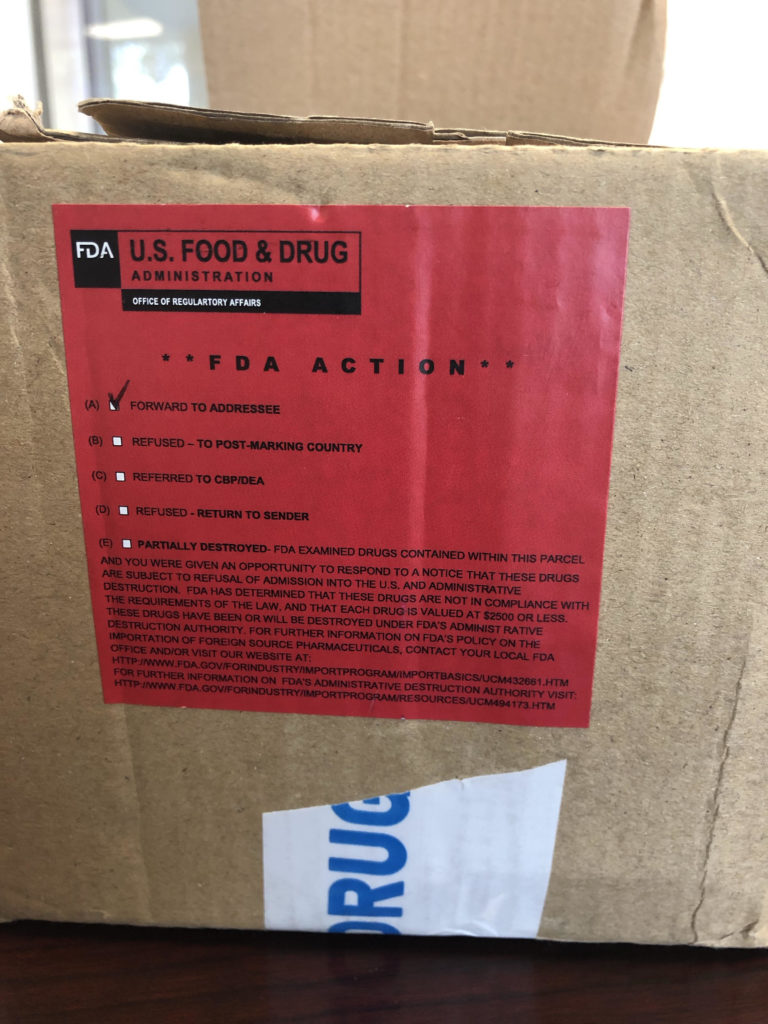
As announced on the Prescription Justice Blog, a person recently exercised their right to defend a prescription drug import that the FDA had detained and she won the case. The drug, Arthrotec, is available for sale at U.S. pharmacies. However, according to the patient, the drug was not affordable here in the U.S. This example shows the FDA exercising its enforcement discretion to permit medicine imports where the patient cited lower costs as the reason for the importation.
If personal drug importation is illegal under most circumstances, then what is behind this“right” to argue with the FDA?
It’s pretty straightforward:
U.S. law that affects personal prescription drug importation explicitly prevents the FDA from destroying a patient’s prescription drug import without “due process” to defend that order. That comes from Section 708of the Food and Drug Administration Safety and Innovation Act of 2012. The purpose of that law was to make it easier, ironically, for the FDA to refuse and destroy imported medicines for personal use. That can be helpful if the drugs are counterfeit or adulterated, but harmful if they are from licensed pharmacies and the patient importing them can’t afford them here—such as the case noted here.
What about the safety and effectiveness of the released imported Arthrotec?
The FDA’s mandate is to protect the public health, including ensuring that drugs sold in the U.S. are safe and effective. How did the FDA know the patient would be safe and that the import is not an unreasonable risk? The FDA’s letter to the patient referred to the imported drug as “misbranded” and “unapproved.” However, almost all drugs sold in pharmacies outside the U.S. would be regarded as misbranded and/or unapproved if sold in the U.S. Misbranded has to do with the drug having a foreign label. A foreign version of a drug sold in the U.S. is called an “unapproved new drug” by the FDA.
In this case, the drug came from a licensed pharmacy in the UK and required a valid prescription. The label was Pfizer’s label for the UK. The argument was made to the FDA that the UK has similarly strict rules for drug regulation and safety. That’s really strong evidence of safety and effectiveness of the drug. Furthermore, the patient apparently supplied the FDA with a copy of the U.S. label to show that they had the full scope of instructions for safe use, per U.S. standards.
The heart of the government’s arguments against Americans ordering medicines from other countries, particularly online, is the “unknowns.”
It’s hard for the FDA to know if an import is safe and effective. There’s a lot of junk sold on the Internet, and their job is hard!
That’s why we started PharmacyChecker.
Per the FDA’s website:
“We appreciate that there is a significant cost differential between drugs available here and those in other countries/areas. However, many drugs sold in foreign countries/areas as ‘foreign versions’ of approved prescription drugs sold in the United States are often of unknown quality with inadequate directions for use and may pose a risk to the patient’s health.”
But once they “know” that a drug comes from a licensed pharmacy in another country, such as the UK, that requires a valid prescription, it becomes hard to defend taking and destroying a person’s medication.
See: PharmacyChecker public comments to the FDA on Section 708
See: The FDA’s final rule and responses to public comments on Section 708
Tagged with: Arthrotec, Due Process, Enforcement, prescription justice

